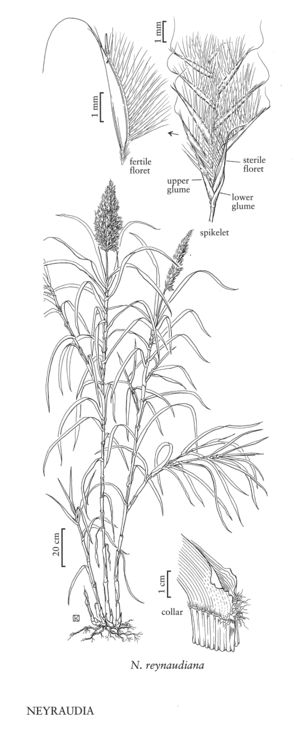Difference between revisions of "Neyraudia reynaudiana"
imported>Volume Importer |
|||
| Line 36: | Line 36: | ||
|basionyms= | |basionyms= | ||
|family=Poaceae | |family=Poaceae | ||
| − | |illustrator=Mary S. Blankenship;Linda A. Vorobik; | + | |illustrator=Mary S. Blankenship;Linda A. Vorobik;Karen Klitz |
|illustration copyright=Utah State University | |illustration copyright=Utah State University | ||
|distribution=Fla. | |distribution=Fla. | ||
Revision as of 20:16, 10 May 2021
Culms 0.8-3.8(5) m tall, 0.2-1.2 cm thick, often branching above the base. Sheaths glabrous, indurate at maturity; ligules both adaxial and abaxial; blades (7)25-89 cm long, 0.3-2.3 cm wide, auriculate, glabrous abaxially, sparsely hirsute adaxially, adaxial collar area lanate, hairs 2.2-7.2 mm, forming a conspicuous white tuft. Panicles 35-73 cm, longest branches 10-28 cm. Spikelets 4.3-9.5 mm; florets (3)5-10, basal floret in each spikelet reduced to an empty lemma. Glumes 0.5-0.8 mm wide; lower glumes (1.3)1.5-3.1 mm; upper glumes (1.6)2-3 mm; basal lemmas 2.5-4.2 mm; fertile lemmas 3-4.4 mm long, 0.9-1 mm wide, pilose on the lateral veins, otherwise glabrous or minutely papillate; awns about 3 mm, exceeding the bifid lemma apices by up to 1.5 mm; paleas 2.4-3 mm; anthers 3, 1.2-1.7 mm. Caryopses 1.5-3 mm, brown. 2n = 40.
Distribution
Fla.
Discussion
Neyraudia reynaudia is an Asian species that was introduced at Chapman Field, U.S. Department of Agriculture, Coral Gables, Florida, probably from PI #39681, in 1915. It is now a troublesome weed in that state, growing in a variety of habitats from marshy areas to dry pinelands.
Selected References
None.
